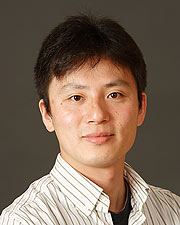Education
- Graduate School
- Kyushu University, Fukuoka, Japan, 2004
- Postdoc
- University of Southern California, Los Angeles, CA, 2007-2013
Areas of Interest
Research Interests
The aim of my laboratory is to understand the cellular and molecular mechanisms in craniofacial birth defects and diseases such as cleft palate and xerostomia. Specifically, we are working to characterize the cell signaling network and metabolism that directs craniofacial disorders, using multidisciplinary approaches including mouse genetics, genomics, proteomics, biochemistry, and molecular biology. The following research projects are ongoing in my laboratory.
1) Cellular metabolism in development and diseases
2) Autophagic machinery in development and diseases
3) Role of WNT signaling in muscle development
4) Role of microRNAs in midfacial development
Publications
- Iwata J, Hacia JG, Suzuki A, Sanchez-Lara PA, Urata M, and Chai Y. (2012) Modulation of non-canonical TGF-β signaling prevents cleft palate in Tgfbr2 mutant mice. J Clin Invest, Mar 1; 122 (3): 873-85.
- Iwata J, Suzuki A, Pelikan RC, Ho TV, Sanchez-Lara PA, Urata M, Dixon MJ, and Chai Y. (2013) Smad4–Irf6 genetic interaction and TGFβ–mediated IRF6 signaling cascade are crucial for palatal fusion in mice. Development, Mar; 140 (6): 1220-30.
- Iwata J, Suzuki A, Pelikan RC, Ho TV, and Chai Y. (2013) Cranial neural crest cells regulate tongue muscle formation via TGFβ–mediated BMP and FGF signaling. J Biol Chem. 288: 29760-70.
- Iwata J, Suzuki A, Pelikan RC, Ho TV, Sanchez-Lara PA, and Chai Y. (2014) Modulation of lipid metabolic defects rescues cleft palate in Tgfbr2 mutant mice. Hum Mol Genetics, Jan 1; 23 (1): 182-93.
- Iwata J, Suzuki A, Yokota T, Ho TV, Pelikan R, Urata M, Sanchez-Lara P, and Chai Y. (2014) TGFβ regulates epithelial–mesenchymal interactions through WNT signaling activity to control muscle development in the soft palate. Development, Feb; 141 (4): 909-17.
